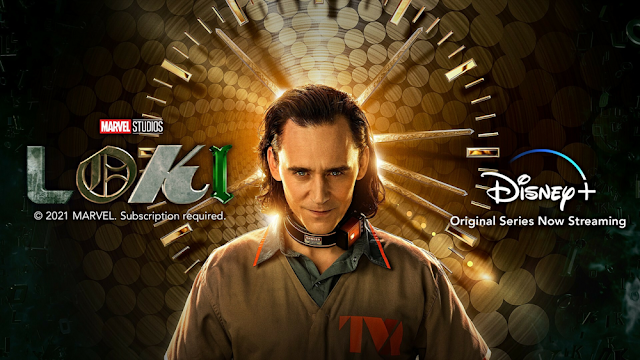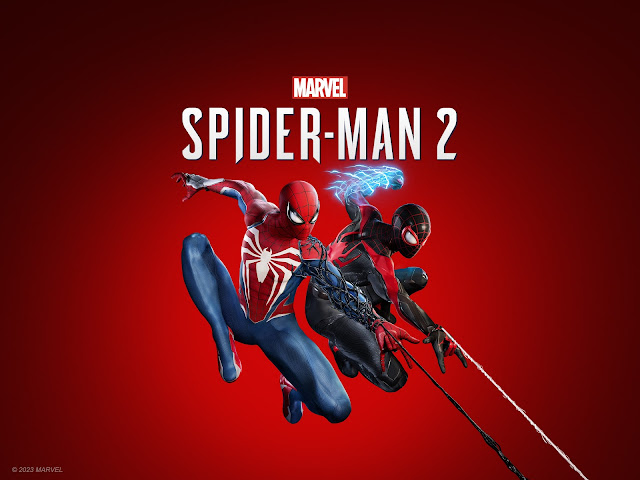"Loki" Season 1 Review
The Marvel Cinematic Universe's Disney+ experiment has been interesting to say the least. With their first two forays with "WandaVision" and "The Falcon and the Winter Soldier", we saw the MCU willing to experiment with its format and add extra depth to characters that were at best the side focus to the main coarse. At the same time, the shows were plagued by obvious flaws, like a lot of side stuff that was left frustratingly underserved by the time the show's came to a close, and an inability to bring their respective series to both a satisfying close and a sense that what we just watched would feel entirely essential once we started diving back into the movie realm, particularly after their positioning in importance to the next few phases of the franchise. It was the big question hanging over the third MCU show this year, "Loki". Would it follow the same pattern established by the previous two series?
"Loki" is an interesting beast in that compared to both "WandaVision" and "The Falcon and the Winter Soldier", Loki is actually a character who has been very well served in the movies. From his introduction in the first "Thor" film in 2011, to taking the center stage as the main villain in the all important first "Avengers" movie from 2012, to then being the best part of the fairly underwhelming "Thor: The Dark World" from 2013, to then being a hilarious part of "Thor Ragnarok" in 2017 and finally meeting his ultimate demise at the beginning of 2018's "Avengers: Infinity War", you wouldn't be wrong at seeing the existence of this new Disney+ show and not do a cynical shrugh. What even is the purpose of this show when the movies said everything that needed to be said with the character, with the only loose end being the character's 2012 self escaping through the botched time heist from 2019's "Avengers Endgame"? You could easily chalk this off as Marvel extracting more juice out of a fan favorite and nothing else.
Thankfully, not only does Marvel prove there is a purpose for a "Loki" solo series, it also ends up being the strongest of the MCU Disney+ TV shows by adding extra depth to an already rich character, doing it in one of the weirdest, most stylistically mesmerizing settings in the MCU yet while retaining the universe's filmic identity, while delivering on plot that finally feels essential to where the MCU is going without coming at the expense of the show itself or sacrificing the MCU's signature character work.
Picking up right from his escape during Endgame's time heist, the show follows Loki as he is immediately captured by the Time Variance Authority led by Mobius (played by the endlessly charismatic Owen Wilson), due to him having broken off his intended place in the timeline. Through a very entertaining (if slightly exposition heavy) first episode, "Loki" establishes the show's eccentric 1960's art deco style setting of the TVA, it's unseen role in the MCU, and give an idea of Loki's arc throughout his series. Let us not forget this is the version of the character that was just so freshly defeated by the just christened original Avengers team from 2012, so he hasn't had to experience his road to redemption started in "Thor: The Dark World", which this first episode swiftly manages to do by catching him up on where his life trajectory was headed post-2012. It also introduced an initial conceit for the series (the hunting of alternate versions of characters AKA "time variants") that ended up evolving far more than anticipated.
The second episode, "The Variant", is the closest equivalent the MCU has had to a buddy cop show. The episode takes full advantage of Loki's serfdom to the TVA, with interactions with Mobius, Miss Minutes (the delightful cartoon played by Tara Strong), Hunter B-15 and others that serve as hilarious contrast to Loki's more thespian approach to the way he interacts with people. The episode goes full in on the idea that they have to hunt another version of Loki, and takes us through different places that gives this thing some sort of swashbuckling feel. It is until we find out this "Variant" version of Loki is a female that we see this show is toying with something many MCU properties have been toying with but never fully committing: the existence of a multiverse.
Slowly teased in the introduction of the TVA in the first episode, there's many kernels of information that suggest this show is finally going to be the one diving into the existence of the multiverse in the MCU. It's very easy to grow cynical at any mention of the multiverse at this point after so many false starts recently, from "Spider-Man: Far from Home" and even "WandaVision", with the latter specifically being sold on its direct lead up to "Doctor Strange and the Multiverse of Madness", and toying with it with the introduction of Evan Peters' version of Quicksilver, before blue balling the entire fanbase with a mean fake-out. However, unlike other shows that toyed with the idea, the idea of a multiverse is more intrinsically tied to the backstory of the TVA and the plot of the show, specifically this alternate version of Loki who calls herself Sylvie (played by Sophia Di Martino), and therefore hovers over the show leading into its finale.
Following the Sylvie reveal on episode 2, episode 3, "Lamentis" actually slows the plot down to do a character driven tale entirely focused on Loki's dynamic with Sylvie, where we see how two different, gender swapped versions of basically the same character try to upstage each other, grow mutual respect for each other, and ultimately tells us what makes each of them tick. It is the kind of episode you would usually get in the middle of a heavily serialized 13-22 traditional season of television, where we would take an entire episode dedicated to the characters we follow, and not what you would expect from a 6-episode mini season. While the streaming era may have conditioned so many people to value plot over character due to short run times, "Lamentis" felt like a nice ode to old eras of TV that understood that character should matter just as much (if not more) than just plot, because what's the point of just watching things unfolding if we don't care about the people those things are unfolding towards to.
"Lamentis" was crucial in establishing the emotional stakes of the characters, because episode 4, "The Nexus Event", is where plot and character all converged and things start to unravel in regards to the TVA. Through Sylvie, we start learning that the existence of the TVA as a grander than life entity created by the Time Keepers to preserve a sacred timeline is a mere front to something or someone that guards the timeline, and it's here where things start moving and slight teases from previous episodes start building towards something that may or may not be of big impact to the MCU. You know, like all the slight details that were all over "WandaVision" that would seem to suggest the existence of a string pulling schemer. If you were one that fell down the rabbit hole of that show figuring out if all the teases were building towards the eventual introduction of the demon Mephisto, I can see how looking at the teases of Loki would make it seem like it was pulling from the same idea, and don't blame anyone for not wanting to see if things were more than they seemed after how badly "WandaVision" burned all the conspiracy theorists by the time it ended and it ended up not being more than the exploration of the main character's grief.
The teasing of a grander string puller never let up, even with the fascinating, delightful detour that was episode 5, "Journey Into Mystery", where the majority of the episode was about getting to experience the madness that was all the different versions of Loki, including the fascinating classic Loki (played by Richard E. Grant) and even my personal favorite that had me laughing uncontrollably every time it was onscreen, Alligator Loki, who's presence alone was enough to put a smile on my face.
Then came the season finale, "For All Time. Always". For anyone that feared all the teasing in regards to a massive string puller that may all lead to something will once again feel like something that's not significant, "Loki" bucks the trend by finally throwing a bone to everyone that loves their comic book stories to have a "grander than life" feel to them that has major implications to what comes next. For comic book fans that know their history, all the teasing from prior episodes were all signaling the debut of time based villain Kang the Conqueror as the ultimate string puller alluded in prior episodes (plus the character's connection to the TVA in the comics). So the reveal of a version of Kang named "He Who Remains" (played by Jonathan Majors, who was cast as Kang for the upcoming "Ant-Man and the Wasp: Quantumania") would have come as expected to comic book fans, a delight to those who follow casting news, or as a complete "who is this?" to anyone that just watches the shows with no knowledge about the things that come out next. What's ironic is that it's rare for a "villain" to show up for the first time in the last episode of a season, deliver a massive exposition dump explaining everything up to this point, and not come out this side of awful. Yet somehow, it worked here, with Majors providing a delightful, scenery chewing performance that made all the information seem significant and not boring or bogged down. It also helps his scenes come at a climax that bucks the usual MCU convention of the last moments of a TV show or movie needing to be a big battle with possibly world-ending implications.
The climax of the season came down to a long conversation with the big bad, and other than Loki and Sylvie's brief sword clash deciding the fate of "He Who Remains", it was all delightfully understated, staying true to the rather low key nature of the show, and providing an ending that, for once, finally fulfills the long teased existence of the multiverse in the Marvel Cinematic Universe, and making one of these Disney+ shows finally feel like an essential watch rather than an appendix to the overall narrative of the universe. And doing so without coming at the expense of this show itself, and never sacrificing the importance of character, which will be crucial as "Loki" heads towards its now confirmed Season 2.
While I enjoyed a lot about "WandaVision" and "Falcon and the Winter Soldier", it was mostly due to the great character work done on those series that made me enjoy them despite the things they ended up not doing or not doing well. In particular, because the last notes those shows ended on weren't their strongest (the "Falcon and the Winter Soldier" finale in particular feeling like a pretty big miss besides what it did for Falcon and his interaction with Isaiah Bradley), it made me look back at the entirety of the shows in a more conflicting matter. With "Loki", this is the first time one of these shows made me feel it hit mostly what it was attempting to do, it deftly balanced the needs of the plot without sacrificing character, while also feeling like its plot implications were not here just to serve the needs of the movies, as the big moments of the finale and the implications of the multiverse seem like it will serve "Doctor Strange and the Multiverse of Madness" just as much as it will dictate what will happen to this show as it goes directly into its second season.
If "Loki" had just been a mini series like "WandaVision", the finale may have been just as unsatisfying as the previous two series, but because it's now an ongoing series, the finale did what many good TV shows do: make me agonize for what comes next. And for that, "Loki" cements its current position as the strongest of the current Disney+ shows.
★★★★☆
4.5/5
Highly Recommended
Written by Alejandro Segovia
TV Scoring rubric:
★ : 1 point ☆ : 0.5 points
★★★★★: Essential. Excellent episodes. Close to flawless. Transcends any minor flaws it may have.
★★★★: Great/Highly recommended. Great episodes. Some flaws worth mentioning, but nothing to worry about.
★★★: Okay/Recommended. Good episodes. Contains things worth watching & experiencing, but flaws can hinder the experience.
★★: Caution/Questionable. Mediocre episodes. The flaws start to significantly hinder anything good the episode has.
★: Avoid. Bad episodes with nothing redeemable about them (some enjoyment as "so bad its good). Preferably don't waste your time.










Comments
Post a Comment